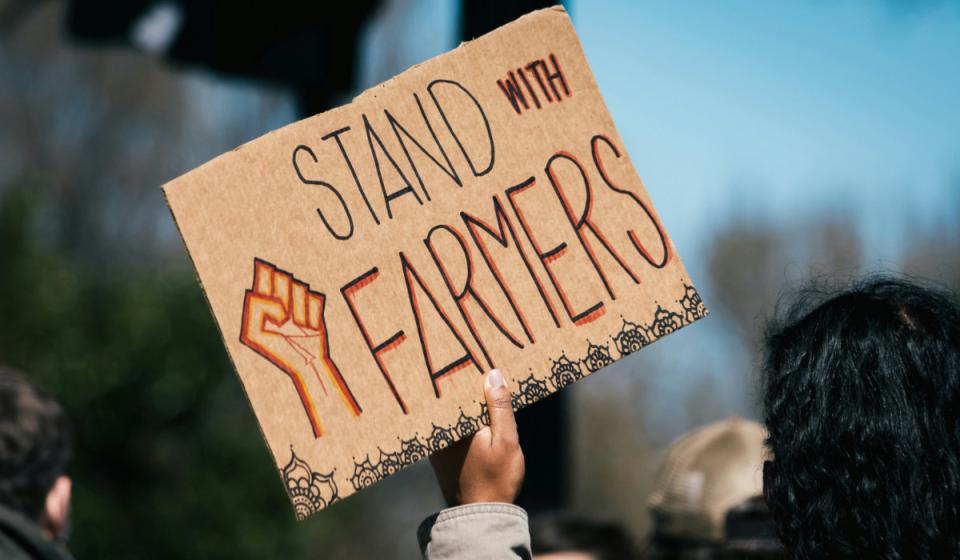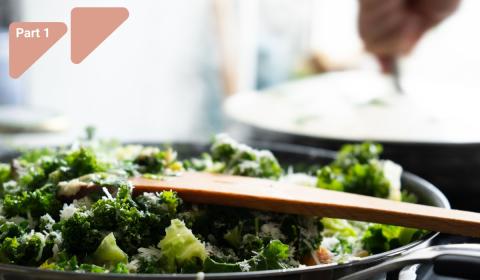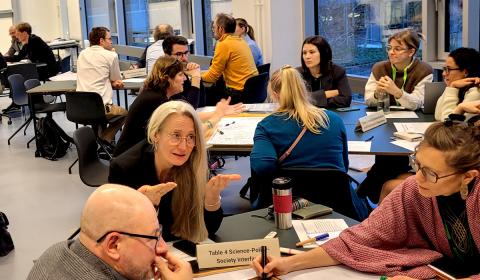
Image source: Gayatri Malhotra on Unsplash
The agricultural sector in Europe is undergoing a challenging phase characterized by crises resulting from significant changes in recent decades. These changes have given rise to a series of unaddressed challenges, including the strategies for sustaining small-scale farming in the face of globalization, achieving a fair transition to eco-friendly practices, and striking a balance between tradition and modernization. This blog aims to draw parallels between these movements, highlighting the shared challenges and aspirations of farmers across different European nations.
The protests underscore the challenges faced by underpaid farmers in a profession marked by escalating pressures, particularly amidst the imperative of ecological transitions. The voices of farmers are frequently distorted as influential corporate entities, led by CEOs detached from the intricacies of agricultural labor, negotiate laws and regulations. These measures result in a harmful cycle. To stay profitable, small-scale farmers must invest in costly machinery, making them competitive but their limited access to capital hampers investment in essential resources and technology, while elevated operating costs and volatile commodity prices place a strain on their financial viability. This often leads to farmers taking out more loans. Eventually, many of these farmers fall into debt traps often timings going bankrupt, which allows larger corporations to buy their land at lower prices for more industrialized farming1,4.
Challenges in market access and the influence of policies favoring larger farms further intensify their economic vulnerability [3]. The push towards a more globalized agricultural market within the EU has favored farms that can operate at a scale suitable for export and mass production. The Common Agricultural Policy (CAP) exacerbates challenges for small-scale farmers by favoring larger operations through subsidy distribution based on land area, promoting land consolidation and industrial-scale farming. This preference for larger entities, perpetuated by influential agricultural companies shaping policies, creates an uneven playing field, limiting market access and economic opportunities for smaller operations. These policies, aimed at boosting competitiveness and market integration, often overlook the realities of small-scale farming, which is less about quantity and more about diverse, quality, and often sustainable production. For instance, the European Union (EU) has imported nearly 93 million tons of food from non-EU countries, amounting to a total value of €101 billion. This reflects a 6% increase in volume and an 18% increase in value compared to the figures recorded in 2012, which is more than they exported in the same year (€84 billions)2.
As the protests go on, governments are negotiating with farmers’ representatives, but those representatives are often big scale producers or have shares in such businesses. These entities have no interest in changing the system because it would threaten their power base. The protests and negotiations are often a means to put on a show and further push the agricultural sector to a more industrialized one, taking the American model of large scale monoculture and opening the free market at the expense of both diversity and small scale farmers3. The September 2021 UN Food Systems Summit faced criticism for being corporate-influenced, with agribusiness dominating and sidelining small-scale producers responsible for 70-80% of global food; concerns were heightened due to the FAO's controversial partnership with CropLife International in October 2020, potentially consolidating corporate control over food and agriculture3.
To exemplify this phenomenon, we can look at France. From the 1970s and 1980s onward, there has been a noticeable consolidation of agricultural land. During this period, 2 million farms and 5 million farmers were lost4. Two-thirds of the land currently in use is dedicated to the expansion of existing farms, resulting in an average farm size that has doubled over the past 30 years. Instances such as Agro Team, where three farmers jointly acquired 2100 hectares of land, have become increasingly common. At present, 14% of France's agricultural land, equivalent to 2 million hectares, is under the ownership of anonymous companies operating with shares4.
The SAFER (Société d'Aménagement Foncier et d'Établissement Rural), tasked with overseeing land markets to support new installations, is tainted by corruption. One-third of land transfers no longer occur between individual farmers but rather between companies through acquisitions and mergers. Agricultural land is increasingly falling under the control of financial institutions. Since 2000, the hectares acquired by anonymous companies have surged by a factor of 27, resulting in a dangerous trend of land concentration combined with financialization. This situation is particularly precarious, given that one-third of farmers are expected to retire within the next six years5.
The expansion of French farms has resulted in increased production, with 75% of farmers relying on intermediaries, predominantly cooperatives. However, over the past two decades, 1600 cooperatives have merged, and currently, a mere 3% of them exercise control over 85% of agricultural production5. These cooperatives, influenced by lobbyists, witness directors earning substantial incomes, ranking six of them among the top 20 in Europe and three globally. Simultaneously, non-cooperative industrial groups monopolizing the French market emerge as major players in the global food industry, led by multimillionaire or even billionaire figures. Supermarkets also invest in specific agri-food sectors, contributing to a concentration of companies across the cooperative network, industry, and supermarkets, shaping the entire agricultural supply chain. This consolidation is steered by a wealthy agricultural elite epitomized by Arnaud Rousseau, the president of FNSEA (National Federation of Agricultural Holders' Unions), who, associated with the group Avril, owns 700 hectares and holds interests in various agricultural and industrial enterprises. This influential class often guides public policy development to advance its industry and monopoly, often at the expense of small and medium-sized farms5.
To sustain profits dominating almost 100% of the national market, the agricultural elites bank on inflation and export strategies to foreign markets. Key French multinationals like Lactalis and Avril pursue global expansion through investments and acquisitions, resulting in a 20% increase in export value in 2023, totaling over 80 billion euros with 77 ratified free trade agreements5. However, the downside of free trade lies in the susceptibility of certain sectors to foreign competition. While the focus often centers on the influx of foreign imports, the impact of French exports on other nations tends to be overlooked. This contradiction creates an agricultural crisis, pitting the elites reliant on free trade for profits against exploited farmers in other countries grappling with heightened competition. The ramifications extend beyond France, affecting all European farmers due to trade agreements frequently signed with the European Union, sparking widespread revolts. If these agreements persist, small farmers face bankruptcy, paving the way for their farms to be acquired by large industrial players6.
In conclusion, the intricate web of challenges underlying the farmer protests hast o be carefully unraveled. The example of the French agricultural sector reveals a need for nuanced solutions that transcend ideological boundaries. Addressing issues such as land concentration, industrial consolidation, and global market dynamics requires a collaborative effort where diverse stakeholders find common ground. Balancing the interests of small scale farmers, consumers and the agricultural elites necessitates a pragmatic approach, recognizing the importance of economic viability for all. Embracing sustainable practices, fostering regionalized policies, and acknowledging the role of small farms in preserving cultural traditions can pave the way for a resilient and inclusive agricultural future.
References
1 Rasva, M., & Jürgenson, E. (2022). Europe’s large-scale land acquisitions and bibliometric analysis. Agriculture, 12(6), 850.
2 EU trade in Food. EU trade in food - Products Eurostat News - Eurostat. (n.d.).
3 A loud lobby for a Silent spring. Corporate Europe Observatory. (n.d.).
4 Guiomar, N., Godinho, S., Correia, T. P., Almeida, M., Bartolini, F., Bezák, P., Biró, M., Bjørkhaug, H., Bojnec, Š., Brunori, G., Corazzin, M., Czekaj, M., Davidova, S., Kania, J., Kristensen, S. B. P., Marraccini, É., Molnár, Z., Niedermayr, J., O’Rourke, E., . . . Wästfelt, A. (2018). Typology and distribution of small farms in Europe: Towards a better picture. Land Use Policy, 75, 784–798. https://doi.org/10.1016/j.landusepol.2018.04.012
5 Merlet, M. (2013). Les accaparements de terres dans le monde : une menace pour tous. Pour, 220, 95-104. https://doi.org/10.3917/pour.220.0095
6 Les terres agricoles françaises sont accaparées par des investisseurs, Mettant en Péril la transition écologique. Retourner à l’accueil de Novethic. (n.d.).


